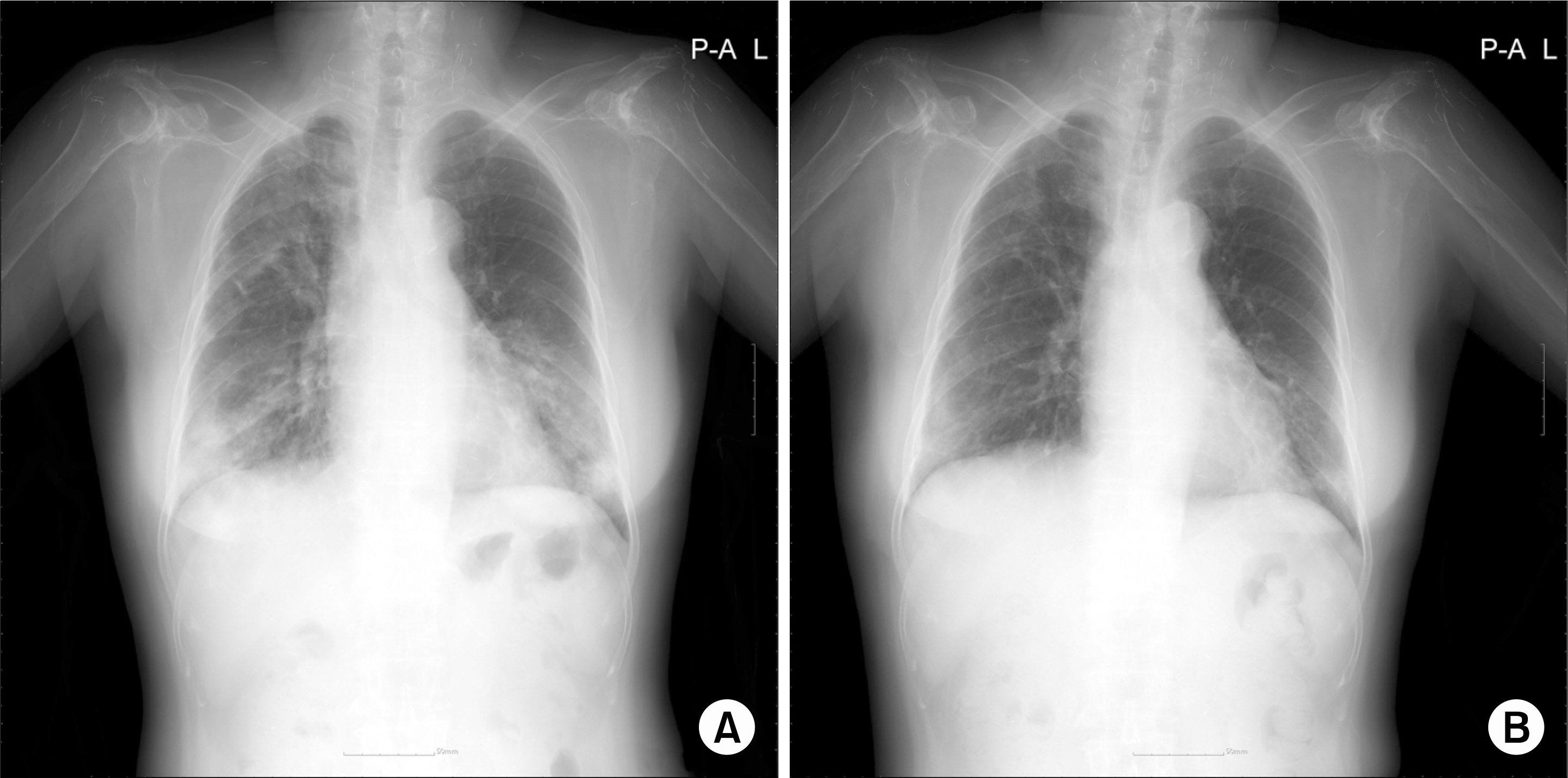Abstract
Tumor necrosis factor-alpha (TNF-α) plays a important role in the pathogenesis of rheumatoid arthritis and Crohn's disease, TNF-α antagonist has been widely used for these disease, but it also plays a major role in cell mediated immunity. Cryptococcus neoformans, an encapsulated, ubiquitous environmental yeast, is pathogenic for humans, primarily those with compromised immune function. Cryptococcus neoformans is believed to be a facultative intracellular pathogen. We report a case of pulmonary cryptococcosis after chimeric anti-TNF monoclonal antibody therapy. No case has been reported in Korea for the best of our knowledge. A 66-year old woman was admitted because of severe cough. She was diagnosed to have rheumatoid arthritis 4 years ago and taken prednisolone and methotrexate. She was started on infliximab and received ten doses, the last dose being administered 6 weeks prior to above symptom. Chest PA and computed tomography of chest revealed multifocal consolidative lesions in both lungs. Pulmonary cryptococcosis confirmed by thoracoscopic lung biopsy tissue stained with Grocott-Gomori methenamine-silver (GMS). Initially the lung lesion responded to amphotericin B but leukopenia developed after 12 days of treatment. It was changed to fluconazole, then leukopenia and the pneumonia also improved. Physicians should remind pulmonary cryptococcosis in patients receiving TNF-α antagonist therapy.
REFERENCES
1). Olsen NJ., Michael Stein C. New drugs for rheumatoid arthritis. N Engl J Med. 2004. 350:2167–79.

2). Shrestha RK., Stoller JK., Honari G., Procop GW., Gordon SM. Pneumonia due to Cryptococcus neoformans in a patient receiving infliximab: possible zoonotic transmission from a pet cockatiel. Respir Care. 2004. 49:606–8.
3). Keane J., Gershon S., Wise RP., Mirabile-Levens E., Kaszinca J., Schwieterman WD, et al. Tuberculosis associated with infliximab, a tumor necrosis factor α -neutralizing agent. N Engl J Med. 2001. 345:1098–104.
4). Bauman SK., Huffnagle GB., Murphy JW. Effects of tumor necrosis factor α on dendritic cell accumulation in lymph nodes draining the immunization site and the impact on the anticryptococcal cell-mediated immune response. Infect Immun. 2003. 71:68–74.
5). Huffnagle GB., Toews GB., Burdick MD., Boyd MB., McAllister KS., McDonald RA, et al. Afferent phase production of TNF-α is required for the development of protective T cell immunity to Cryptococcus neoformans. J Immunol. 1996. 157:4529–36.
6). Hage CA., Wood KL., Winer-Muram HT., Wilson SJ., Sarosi G., Knox KS. Pulmonary cryptococcosis after initiation of anti-tumor necrosis factor-alpha therapy. Chest. 2003. 124:2395–7.
7). Warris A., Bjorneklett A., Gaustad P. Invasive pulmonary aspergillosis associated with infliximab therapy. N Engl J Med. 2001. 344:1099–100.

8). True DG., Penmetcha M., Peckham SJ. Disseminated cryptococcal infection in rheumatoid arthritis treated with methotrexate and infliximab. J Rheumatol. 2002. 29:1561–3.
9). Arnett FC., Edworthy SM., Bloch DA., McShane DJ., Fries JF., Cooper NS, et al. The American Rheumatism Association 1987 revised criteria for the classification of rheumatoid arthritis. Arthritis Rheum. 1988. 31:315–24.

10). Tucker SC., Casadevall A. Replication of Cryptococcus neoformans in macrophages is accompanied by phagosomal permeabilization and accumulation of vesicles containing polysaccharide in the cytoplasm. Proc Natl Acad Sci US A. 2002. 99:3165–70.

11). Mandell GL., Bennett JE., Dolin R. Principles and practice of infectious disease. 6th ed.p. 2997–3009. Philadelphia, Elsevier Inc;2005.
12). Cheon WS., Eom KS., Yoo BK., Jang SH., Bahn JW., Kim DG, et al. A case of pulmonary cryptococcosis by capsule-deficient Cryptococcus neoformans. Kor J Int Med. 2006. 21:83–7.
13). 노은숙: 박민경: 안지원: 이승재: 손혜숙: 성혜영등. 면역기능이정상인환자에서의폐효모균증1례. 결핵및호흡기질환. 2005. 59:700–3.




 PDF
PDF ePub
ePub Citation
Citation Print
Print




 XML Download
XML Download